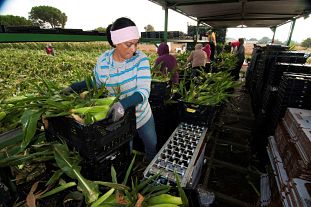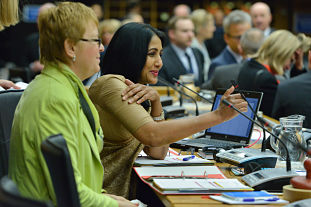-
 Rethinking the governance of external consultancy in the public sector
Rethinking the governance of external consultancy in the public sector
Management consultancy use in the public sector has long provoked controversy, with questions over efficiency, effectiveness and ethics. These continue to be raised globally, with occasional scandals with firms such as McKinsey in the USA, PwC in Australia or Bain & Co. in the UK. This all suggests that approaches to managing the use of consultancy have not been effective. In fact, there are few checks and balances on consultancy which is surprising given how much is spent on it (over £3 billion in the UK public sector in 2023-4). One periodic policy response, currently planned by the UK government, is to cut the use of external consultants and do more work internally through an empowered and enlarged civil service. This ‘insourcing’ mostly makes sense, but there will always be some need for external expertise. So, what can be done by both clients and consultancies to help make it effective?
-
 Guaranteeing public sector adoption of trustworthy AI - a task that should not be left to procurement
Guaranteeing public sector adoption of trustworthy AI - a task that should not be left to procurement
The UK government's approach to AI regulation is lacking and, if left unaddressed, this could cause problems in the public sector.
-
 Reform Development Finance Institutions’ (DFIs) grievance mechanisms to uphold human rights
Reform Development Finance Institutions’ (DFIs) grievance mechanisms to uphold human rights
In November 2018, leaders from nine communities from the Democratic Republic of Congo (DR Congo) whose land rights and livelihood were affected by the PHC-Feronia large-scale palm oil plantation took a historic step and filed a complaint with the Independent Complaints Mechanism (ICM), a so-called ‘alternative dispute mechanism’ aimed at finding a solution outside of courts. With the support of local and international civil society, they formulated clear requests concerning recognition of their land titles and remediation for the socio-environmental damages suffered since the DFIs decided to support the PHC-Feronia palm oil project.
-
 Community-centred services support residents to build financial resilience
Community-centred services support residents to build financial resilience
From April to July 2022, community researchers from Lawrence Hill, Bristol, led in-depth interviews with residents, and held co-analysis and co-design workshops with stakeholders, to understand the financial lives of low-income households in their community, explore barriers and enablers to financial resilience and develop solutions.
-
 Tackling precarious work through financial regulation and private debt relief
Tackling precarious work through financial regulation and private debt relief
The cost of living crisis initiated by the COVID-19 pandemic and the ongoing energy crisis has pushed firms and households to borrow significant amounts of money to meet their everyday needs. Yet, this is not a one-off event.
-
 Definancialisation and Workspace Regulation as a Public Health Policy Tool
Definancialisation and Workspace Regulation as a Public Health Policy Tool
One of the most pressing issues policymakers, business groups, and academics face in the context of the post-COVID-19 recovery is how the economy can become more resilient to similar future challenges. Achieving resilience and sustainability in times of health crises requires a better understanding of social and economic conditions that shape workplace and living conditions.
-
 Returning to growth: the role of management practices in productivity
Returning to growth: the role of management practices in productivity
Enabling economic recovery in a post covid-19 world is a key challenge recognised by policymakers, business groups and academic researchers. Finding ways to increase firm-level productivity will therefore become even more important than before. Even before the crisis caused by covid-19 there were many possible explanations for the long-standing weakness of productivity in the economy at large and within firms, with no single factor explaining the entire puzzle.
-
 The fight for financial inclusion: free access to cash must be guaranteed across the UK
The fight for financial inclusion: free access to cash must be guaranteed across the UK
The rise of digital payments has put cash and its infrastructure under pressure: first bank branches closed as online banking increased, and now ATMs are shutting down at record pace.
-
 Work and workers should be central in the UK national food strategy
Work and workers should be central in the UK national food strategy
The conversations around the future of food, the Agricultural Bill and the UK national food strategy tend to focus exclusively on people as eaters, forgetting the role that women and men have in farming, harvesting, processing, selling, distributing and disposing of food.
-
 Privacy implications of pet wearables
Privacy implications of pet wearables
Pet wearables have significant privacy implications for consumers. This research into the extent of data collected by pet wearables has led to a clear understanding that consumer pet wearables available on the market capture far more data of owners than actual pets, and potentially mislead consumers into underestimating this extent of data capture. Moreover, pet data descriptions are often vague and may understate their potential to indirectly identify their owners or third parties.
-
 Economic and social well-being in the UK: how living standards should be measured
Economic and social well-being in the UK: how living standards should be measured
This briefing calls for changes to the type of data collected and the approach to analysing the data, with a view to providing a more accurate indicator of living standards. This, in turn, will provide a clearer picture of economic and social well-being in the UK.
-
 China’s Investment in Europe: labour management practice in the electronics industry requires overhaul
China’s Investment in Europe: labour management practice in the electronics industry requires overhaul
This research investigates the restructuring of the electronics industry, with a focus on labour relations at Chinese companies in Europe.
-
 Women at the top: women in senior positions can help boards achieve social goals
Women at the top: women in senior positions can help boards achieve social goals
This study explores the positive influence that (more) women and the position held by women may exert on boards of directors.
-
 Fresh approach needed towards regulation and support of ‘green’ social enterprises in the emerging new economy
Fresh approach needed towards regulation and support of ‘green’ social enterprises in the emerging new economy
This research focuses on social enterprises responding to climate change and the regulatory barriers and facilitators they encounter.
-
 Conflicts of interest in healthcare: NHS procurement rules must be clarified
Conflicts of interest in healthcare: NHS procurement rules must be clarified
This research takes stock of recent developments in NHS governance and explores ways to clarify procurement rules.
-
 The 2008 Global Financial Crisis: effects on mental health and suicide
The 2008 Global Financial Crisis: effects on mental health and suicide
The 2008-2013 recession was followed by rises in suicide in England and other affected countries. It is critical that we learn lessons from the recent recession to reduce the impact of future economic downturns on suicide and mental health.
-
 Managing change without the use of external consultants: how to organise consultant managers
Managing change without the use of external consultants: how to organise consultant managers
Management consultancy should no longer be seen simply as something done by influential outsiders, but as part of the toolkit of any manager responsible for delivering change.
-
 A new net zero resilience index finds that jobs vulnerable to decarbonisation require a regional approach
A new net zero resilience index finds that jobs vulnerable to decarbonisation require a regional approach
Achieving net-zero requires extensive economic changes in the world of work for many. As some sectors will pivot to new activities to meet the demands of the net zero transition, new jobs will emerge. Others will decline entirely as sectors (such as offshore oil and gas) are phased-down.
 Rethinking the governance of external consultancy in the public sector
Management consultancy use in the public sector has long provoked controversy, with questions over efficiency, effectiveness and ethics. These continue to be raised globally, with occasional scandals with firms such as McKinsey in the USA, PwC in Australia or Bain & Co. in the UK. This all suggests that approaches to managing the use of consultancy have not been effective. In fact, there are few checks and balances on consultancy which is surprising given how much is spent on it (over £3 billion in the UK public sector in 2023-4). One periodic policy response, currently planned by the UK government, is to cut the use of external consultants and do more work internally through an empowered and enlarged civil service. This ‘insourcing’ mostly makes sense, but there will always be some need for external expertise. So, what can be done by both clients and consultancies to help make it effective?
Rethinking the governance of external consultancy in the public sector
Management consultancy use in the public sector has long provoked controversy, with questions over efficiency, effectiveness and ethics. These continue to be raised globally, with occasional scandals with firms such as McKinsey in the USA, PwC in Australia or Bain & Co. in the UK. This all suggests that approaches to managing the use of consultancy have not been effective. In fact, there are few checks and balances on consultancy which is surprising given how much is spent on it (over £3 billion in the UK public sector in 2023-4). One periodic policy response, currently planned by the UK government, is to cut the use of external consultants and do more work internally through an empowered and enlarged civil service. This ‘insourcing’ mostly makes sense, but there will always be some need for external expertise. So, what can be done by both clients and consultancies to help make it effective? Guaranteeing public sector adoption of trustworthy AI - a task that should not be left to procurement
The UK government's approach to AI regulation is lacking and, if left unaddressed, this could cause problems in the public sector.
Guaranteeing public sector adoption of trustworthy AI - a task that should not be left to procurement
The UK government's approach to AI regulation is lacking and, if left unaddressed, this could cause problems in the public sector. Reform Development Finance Institutions’ (DFIs) grievance mechanisms to uphold human rights
In November 2018, leaders from nine communities from the Democratic Republic of Congo (DR Congo) whose land rights and livelihood were affected by the PHC-Feronia large-scale palm oil plantation took a historic step and filed a complaint with the Independent Complaints Mechanism (ICM), a so-called ‘alternative dispute mechanism’ aimed at finding a solution outside of courts. With the support of local and international civil society, they formulated clear requests concerning recognition of their land titles and remediation for the socio-environmental damages suffered since the DFIs decided to support the PHC-Feronia palm oil project.
Reform Development Finance Institutions’ (DFIs) grievance mechanisms to uphold human rights
In November 2018, leaders from nine communities from the Democratic Republic of Congo (DR Congo) whose land rights and livelihood were affected by the PHC-Feronia large-scale palm oil plantation took a historic step and filed a complaint with the Independent Complaints Mechanism (ICM), a so-called ‘alternative dispute mechanism’ aimed at finding a solution outside of courts. With the support of local and international civil society, they formulated clear requests concerning recognition of their land titles and remediation for the socio-environmental damages suffered since the DFIs decided to support the PHC-Feronia palm oil project. Community-centred services support residents to build financial resilience
From April to July 2022, community researchers from Lawrence Hill, Bristol, led in-depth interviews with residents, and held co-analysis and co-design workshops with stakeholders, to understand the financial lives of low-income households in their community, explore barriers and enablers to financial resilience and develop solutions.
Community-centred services support residents to build financial resilience
From April to July 2022, community researchers from Lawrence Hill, Bristol, led in-depth interviews with residents, and held co-analysis and co-design workshops with stakeholders, to understand the financial lives of low-income households in their community, explore barriers and enablers to financial resilience and develop solutions. Tackling precarious work through financial regulation and private debt relief
The cost of living crisis initiated by the COVID-19 pandemic and the ongoing energy crisis has pushed firms and households to borrow significant amounts of money to meet their everyday needs. Yet, this is not a one-off event.
Tackling precarious work through financial regulation and private debt relief
The cost of living crisis initiated by the COVID-19 pandemic and the ongoing energy crisis has pushed firms and households to borrow significant amounts of money to meet their everyday needs. Yet, this is not a one-off event. Definancialisation and Workspace Regulation as a Public Health Policy Tool
One of the most pressing issues policymakers, business groups, and academics face in the context of the post-COVID-19 recovery is how the economy can become more resilient to similar future challenges. Achieving resilience and sustainability in times of health crises requires a better understanding of social and economic conditions that shape workplace and living conditions.
Definancialisation and Workspace Regulation as a Public Health Policy Tool
One of the most pressing issues policymakers, business groups, and academics face in the context of the post-COVID-19 recovery is how the economy can become more resilient to similar future challenges. Achieving resilience and sustainability in times of health crises requires a better understanding of social and economic conditions that shape workplace and living conditions. Returning to growth: the role of management practices in productivity
Enabling economic recovery in a post covid-19 world is a key challenge recognised by policymakers, business groups and academic researchers. Finding ways to increase firm-level productivity will therefore become even more important than before. Even before the crisis caused by covid-19 there were many possible explanations for the long-standing weakness of productivity in the economy at large and within firms, with no single factor explaining the entire puzzle.
Returning to growth: the role of management practices in productivity
Enabling economic recovery in a post covid-19 world is a key challenge recognised by policymakers, business groups and academic researchers. Finding ways to increase firm-level productivity will therefore become even more important than before. Even before the crisis caused by covid-19 there were many possible explanations for the long-standing weakness of productivity in the economy at large and within firms, with no single factor explaining the entire puzzle. The fight for financial inclusion: free access to cash must be guaranteed across the UK
The rise of digital payments has put cash and its infrastructure under pressure: first bank branches closed as online banking increased, and now ATMs are shutting down at record pace.
The fight for financial inclusion: free access to cash must be guaranteed across the UK
The rise of digital payments has put cash and its infrastructure under pressure: first bank branches closed as online banking increased, and now ATMs are shutting down at record pace. Work and workers should be central in the UK national food strategy
The conversations around the future of food, the Agricultural Bill and the UK national food strategy tend to focus exclusively on people as eaters, forgetting the role that women and men have in farming, harvesting, processing, selling, distributing and disposing of food.
Work and workers should be central in the UK national food strategy
The conversations around the future of food, the Agricultural Bill and the UK national food strategy tend to focus exclusively on people as eaters, forgetting the role that women and men have in farming, harvesting, processing, selling, distributing and disposing of food. Privacy implications of pet wearables
Pet wearables have significant privacy implications for consumers. This research into the extent of data collected by pet wearables has led to a clear understanding that consumer pet wearables available on the market capture far more data of owners than actual pets, and potentially mislead consumers into underestimating this extent of data capture. Moreover, pet data descriptions are often vague and may understate their potential to indirectly identify their owners or third parties.
Privacy implications of pet wearables
Pet wearables have significant privacy implications for consumers. This research into the extent of data collected by pet wearables has led to a clear understanding that consumer pet wearables available on the market capture far more data of owners than actual pets, and potentially mislead consumers into underestimating this extent of data capture. Moreover, pet data descriptions are often vague and may understate their potential to indirectly identify their owners or third parties. Economic and social well-being in the UK: how living standards should be measured
This briefing calls for changes to the type of data collected and the approach to analysing the data, with a view to providing a more accurate indicator of living standards. This, in turn, will provide a clearer picture of economic and social well-being in the UK.
Economic and social well-being in the UK: how living standards should be measured
This briefing calls for changes to the type of data collected and the approach to analysing the data, with a view to providing a more accurate indicator of living standards. This, in turn, will provide a clearer picture of economic and social well-being in the UK. China’s Investment in Europe: labour management practice in the electronics industry requires overhaul
This research investigates the restructuring of the electronics industry, with a focus on labour relations at Chinese companies in Europe.
China’s Investment in Europe: labour management practice in the electronics industry requires overhaul
This research investigates the restructuring of the electronics industry, with a focus on labour relations at Chinese companies in Europe. Women at the top: women in senior positions can help boards achieve social goals
This study explores the positive influence that (more) women and the position held by women may exert on boards of directors.
Women at the top: women in senior positions can help boards achieve social goals
This study explores the positive influence that (more) women and the position held by women may exert on boards of directors. Fresh approach needed towards regulation and support of ‘green’ social enterprises in the emerging new economy
This research focuses on social enterprises responding to climate change and the regulatory barriers and facilitators they encounter.
Fresh approach needed towards regulation and support of ‘green’ social enterprises in the emerging new economy
This research focuses on social enterprises responding to climate change and the regulatory barriers and facilitators they encounter. Conflicts of interest in healthcare: NHS procurement rules must be clarified
This research takes stock of recent developments in NHS governance and explores ways to clarify procurement rules.
Conflicts of interest in healthcare: NHS procurement rules must be clarified
This research takes stock of recent developments in NHS governance and explores ways to clarify procurement rules. The 2008 Global Financial Crisis: effects on mental health and suicide
The 2008-2013 recession was followed by rises in suicide in England and other affected countries. It is critical that we learn lessons from the recent recession to reduce the impact of future economic downturns on suicide and mental health.
The 2008 Global Financial Crisis: effects on mental health and suicide
The 2008-2013 recession was followed by rises in suicide in England and other affected countries. It is critical that we learn lessons from the recent recession to reduce the impact of future economic downturns on suicide and mental health. Managing change without the use of external consultants: how to organise consultant managers
Management consultancy should no longer be seen simply as something done by influential outsiders, but as part of the toolkit of any manager responsible for delivering change.
Managing change without the use of external consultants: how to organise consultant managers
Management consultancy should no longer be seen simply as something done by influential outsiders, but as part of the toolkit of any manager responsible for delivering change. A new net zero resilience index finds that jobs vulnerable to decarbonisation require a regional approach
Achieving net-zero requires extensive economic changes in the world of work for many. As some sectors will pivot to new activities to meet the demands of the net zero transition, new jobs will emerge. Others will decline entirely as sectors (such as offshore oil and gas) are phased-down.
A new net zero resilience index finds that jobs vulnerable to decarbonisation require a regional approach
Achieving net-zero requires extensive economic changes in the world of work for many. As some sectors will pivot to new activities to meet the demands of the net zero transition, new jobs will emerge. Others will decline entirely as sectors (such as offshore oil and gas) are phased-down.